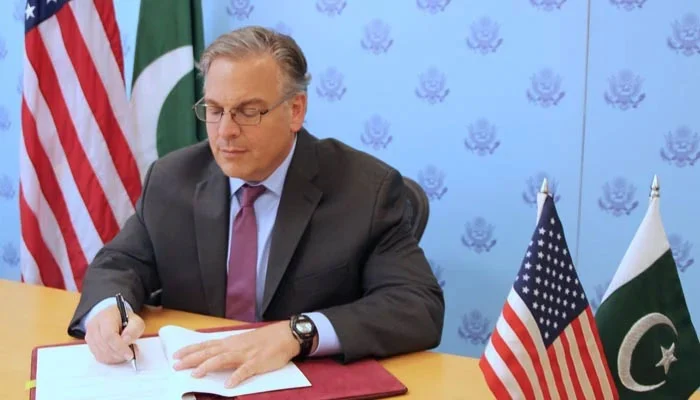Islamabad, Sep 10: Donald Blome, the US ambassador to Islamabad, spoke on Tuesday at the Pakistan Institute for Parliamentary Services (PIPS) to introduce the “Recharge Pakistan” program.
The large-scale climate initiative intends to improve water security and strengthen flood resistance in Pakistan’s most susceptible areas.In his opening remarks, Ambassador Blome acknowledged PIPS, an independent research and training center for lawmakers founded with financing from the United States. He underlined how important it is for the institute to train and assist Pakistani parliamentarians by doing in-depth policy research and training.
The “Recharge Pakistan” project, to which the US is contributing $5 million, aims to address serious water management issues made worse by climate change. Due to the disruption of natural water recharge processes caused by climate change, groundwater which is essential for agriculture, cattle, and drinking water is in danger. Groundwater, according to Ambassador Blome, is like a battery that fuels vital life functions but is getting harder and harder to recharge because of shifting environmental conditions.
A network of green infrastructure solutions will be implemented as part of the project to repair floodwater channels, replenish wetlands, and enhance soil water absorption. A reduction in greenhouse gas emissions of approximately 53,000 tons of CO2 is anticipated, along with the creation of 127 additional groundwater storage basins and a decrease in the risk of floods over 50,000 hectares.
It is estimated that the effort will help nearly seven million people in Balochistan, Khyber Pakhtunkhwa, and Sindh directly and around 687,000 people indirectly. Citing cooperative projects like the Mangla and Tarbela dams, the envoy emphasized the long-standing cooperation between the United States and Pakistan in water management. He emphasized current initiatives undertaken under the framework of the U.S.-Pakistan “Green Alliance,” which centers on water management, smart agriculture, and renewable energy.
“Recharge Pakistan” is an additional commitment to mitigating the effects of climate change, building on this long-standing collaboration. The project is a reaction to Pakistan’s harsh experiences with the climate issue, which include the disastrous floods of 2022 and the consequences of warming temperatures on agriculture and glaciers.
Blome praised the World Wildlife Fund (WWF), the Ministry of Climate Change and Environmental Coordination, and other partners for their planning and execution of the project. He restated the United States’ commitment to helping Pakistan create a future that is greener and more resilient to climate change.
The launch event was a major milestone in the continuing partnership between the United States and Pakistan, which aims to support sustainable development in one of the most climate-vulnerable areas of the globe and lessen the negative effects of climate change.
